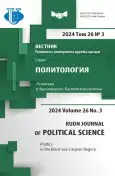Features of Political Processes in Central Asian Countries at the Present Stage
- Autores: Garbuzarova E.G.1
-
Afiliações:
- Kyrgyz-Russian Slavic University named after B. N. Yeltsin
- Edição: Volume 26, Nº 3 (2024): Politics in the Black Sea-Caspian Region
- Páginas: 477-490
- Seção: THE POLITICS OF EURASIA YESTERDAY AND TODAY
- URL: https://journal-vniispk.ru/2313-1438/article/view/322417
- DOI: https://doi.org/10.22363/2313-1438-2024-26-3-477-490
- EDN: https://elibrary.ru/BIZWJY
- ID: 322417
Citar
Texto integral
Resumo
In the context of the crisis of the liberal democratic model, authoritarian tendencies strengthen in all Central Asian countries, including Kyrgyzstan. This country demonstrated success in the process of democratic transit for a long time. The purpose of the article is to analyze the content and nature of political processes in Central Asian countries at the present stage. Based on the method of comparative analysis common and distinctive features in the political regimes of the countries of the region are highlighted. The Central Asian countries are grouped according to the principle of recurring trends in domestic political processes. In Central Asian countries, Kyrgyzstan and Tajikistan are the most vulnerable to “color revolutions”. The likelihood of such a scenario, fraught with political instability, encourages some political leaders of the countries of the region (Kazakhstan, Uzbekistan) to carry out reforms and design a political regime that proportionally reflects economic reality and social needs, while others (Kyrgyzstan, Tajikistan) resort to methods of “tightening the screws”, clearing the space from political opposition. In both cases, this leads to the strengthening of the regime of personal power of the heads of state of the Central Asian countries, and, consequently, the president will continue to remain at the top of the power hierarchy. However, the results of the recent presidential elections in Uzbekistan and the presidential and parliamentary elections in Kazakhstan show that there is a demand for a strong government capable of ensuring socio-political order and stability in these societies.
Palavras-chave
Sobre autores
Elena Garbuzarova
Kyrgyz-Russian Slavic University named after B. N. Yeltsin
Autor responsável pela correspondência
Email: play_elenag@mail.ru
ORCID ID: 0000-0003-3481-4363
Doctor of Political Science
Bishkek, Kyrgyz RepublicBibliografia
- Biryukov, S.V., Chirun, S.N., Andreev, A.V., & Rakhimzhanova, D.A. (2023). The political crisis in Kazakhstan: Origins, current state, prospects for development and settlement. Tomsk State University Journal of Philosophy, Sociology and Political Science, 71, 225–236. (In Russian). https://doi.org/10.17223/1998863X/71/21
- Di Gregorio, A. (2020). The crisis of modern democracy and the emergence of new intermediate categories between democracy and authoritarianism. Journal of Foreign Legislation and Comparative Law, 3, 26–33. https://doi.org/ 10.12737/jflcl.2020.017 (In Russian).
- Ionova, E. (2021). The results of the presidential elections in Uzbekistan: The economic and political course of Sh. Mirziyoyev. Russia and the new states of Eurasia, (4), 97–114. (In Russian). https://doi.org/10.20542/2073-4786-2021-4-97-114
- Khadyrov, R.Y. (2023). The institutional model of the political system of Tajikistan: Hierarchy and specificity of institutions. International Relations, 2023, (1), 12–19. https //doi.org/10.7256/2454-0641.2023.1.39684 (In Russian).
- Kharitonova, O.G. (2017). Political regimes and regime changes in the mirror of scientific discourse. RUDN Journal of Political Science, 19(4) 379–391. (In Russian). https://doi.org/10.22363/2313-1438-2017-19-4-379-391
- Kharitonova, O.G., & Kudryashova, I.V. (2022). Political regimes and regime changes in the foam of the populist wave. Political Science (RU), (1), 224–244. (In Russian). https://doi.org/10.31249/poln/2022.01.10
- Laumulin, M.S. (2016). On the question of the formation of post-Soviet statehood in Central Asia. Outlines of global transformations, 5, 9, 95–113. (In Russian).
- Lewis, D.G. (2021). Varieties of Authoritarianism in Central Asia. Routledge Handbook of Contemporary Central Asia. (pp. 1–16). Routledge.
- Pakhrutdinov, S.I. (2019). Uzbekistan: responsibility for sustainable development and the intensity of accelerated changes. Trajectories of Russia’s political development: Institutes, projects, actors: materials of the All-Russian Scientific conference RAPN (pp. 301–303). Moscow: MPSU. (In Russian).
- Sharifzoda, A., & Sharifzoda, M.T. (2018). The role of the leader of the nation in the development of the economy of Tajikistan. Bulletin of TSU LBP. Series of Humanitarian Sciences, (4), 5–15. (In Russian).
- Zakaria, F. (2004). The emergence of illiberal democracies. Logos, 2, 55–70. (In Russian).
- Zhaparov, S. (2023). Zhany Kyrgyzstand kuruunun bagyty (ideologiyasy). Bishkek: Print-Express. (In Kyrgiz).
- Zhiltsov, S.S. (2020). Central Asia: features of political development. The Herald of the Diplomatic Academy of the MFA of Russia. Russia and the World, 1, 143–160. (In Russian).
- Zvyagelskaya, I.D. (2018). The Middle East and Central Asia: Global trends in regional execution. Moscow: Aspect Press. (In Russian).
Arquivos suplementares









